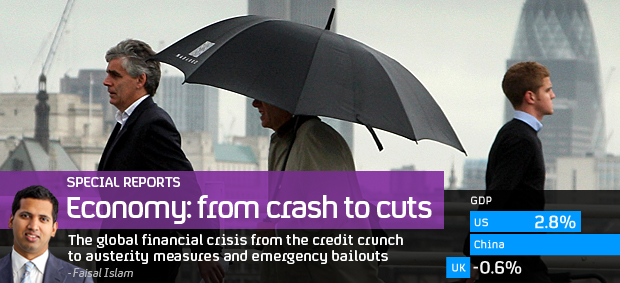Shares rise as euro rescue deal emerges
Share prices increase as a 3tr euro package is proposed to save the single currency from collapse. Channel 4 News Economics Editor Faisal Islam reports from Greece.
The proposals are designed to allow Greece to default on its debts in an orderly way without dragging down other countries and commercial banks.
They have reportedly emerged from discussions in Washington over the weekend, attended by officials from the International Monetary Fund (IMF) and World Bank and finance ministers from the G20 group of leading economies.

But Greek Finance Minister Evangelos Venizelos said he had not had talks about a debt default with Christine Lagarde, the head of the IMF, or European Central Bank head, Jean-Claude Trichet. “We have reached a point where there are reports about what has been said in a closed door meeting with the participation of only Mrs. Lagarde, Mr. Trichet and myself,” he said. “What is absolutely sure is that there hasn’t been and couldn’t have been any discussion about the so-called scenario of an orderly default.”
German Chancellor Angela Merkel said on Sunday that allowing Greece to default would destroy investor confidence in the eurozone.
In early trading today, the markets were sceptical about the chances of success, with Britain’s FTSE share index opening 2 per cent down before recovering.
Share prices later rose, with bank stocks leading the way. But there was still nervousness in the markets as traders looked for signs that concrete measures would be proposed to deal with the dangers to the world economy.
There will be wobbles and uncertainty. Louise Cooper, BGC Partners
Louise Cooper, markets analyst at BGC Partners, predicted further turbulence. She said: “A sufficiently credible plan to solve the eurozone crisis will necessitate changes to treaties, laws, and not least the German constitution. There will be wobbles and uncertainty at every vote and stage of political implementation.
“So what have we to look forward to? Continued financial uncertainty, high volatility and nervousness.”
Ben Critchley, a sales trader at IG Index, said: “For now at least, it looks as if markets are giving some credence to a firm plan on how to tackle the debt crisis beginning to emerge. But if recent experience is anything to go by, this patience is unlikely to last too long if details are not forthcoming.”
‘Dangerous phase’
Chancellor George Osborne warned over the weekend that the world economy had reached a “dangerous phase” and credible action was needed within six weeks.
The head of the IMF, Christine Lagarde, said after talks in Washington that there had been “a common diagnosis and a shared sense of common purpose”.
Timetable
Later this week, the European Central Bank, European Commission and IMF will return to Athens to discuss the next tranche of a loan to Greece. On Tuesday, the Greek parliament is due to vote on the government’s plans for a new property tax that has caused outrage among the middle classes. On the same day, Greek Prime Minister George Papandreou will discuss his country’s economic reform programme with Ms Merkel in Berlin.
Referring to reports of an orderly debt default, she said: “We need to take steps we can control. What we can’t do is destroy the confidence of all investors mid-course and get a situation where they say that if we’ve done it for Greece, we will also do it for Spain, for Belgium, or any other country.” On Thursday, the German parliament is due to vote on new powers for the eurozone’s bailout fund.
Greece has been beset by protests as it it tries to push through its austerity programme of tax increases and public sector cuts. The government is putting 30,000 public sector workers on notice, cutting their pay by 60 per cent and giving them a year to find new work in the state sector or face the sack. The two biggest unions in the country, representing about half of Greece’s workforce, are planning two 24-hour strikes in October.
'The rescue package'
According to reports, the package could look like this:
A 50 per cent writedown of Greek debt.
The EU's bailout fund - the European Financial Stability Facility - would see its limit of 440bn euros (£384bn) raised to about 2tr euros (£1.7tn). It would take on the role of lending to eurozone governments that are finding it difficult to borrow from commercial banks.
Eurozone banks would be recapitalised/given financial support so they could cope with the Greek debt writedown and losses from loans to other struggling eurozone countries.
Topics
Business, Angela Merkel, Banking, Coalition, Conservative Party, CutsCheck, Cutsmap, David Cameron, Economic crisis: special report, Ed Balls, Ed Miliband, European cuts, European Union, Ireland bailout, Labour Party, Liberal Democrats, Nick Clegg, Public Sector, Silvio Berlusconi, Spending cuts, UK economy, Unemployment-
Latest news
-
Windrush scandal: returning to the UK after a forty year wait6m

-
Netanyahu ‘survival’ depends on ‘expanding war’ says head of Palestinian National Initiative5m

-
Proposed law change could strip parental rights from paedophiles5m

-
Hugh Grant settles privacy lawsuit against The Sun newspaper publisher2m

-
Post Office Scandal: what did top executive know?6m

-





